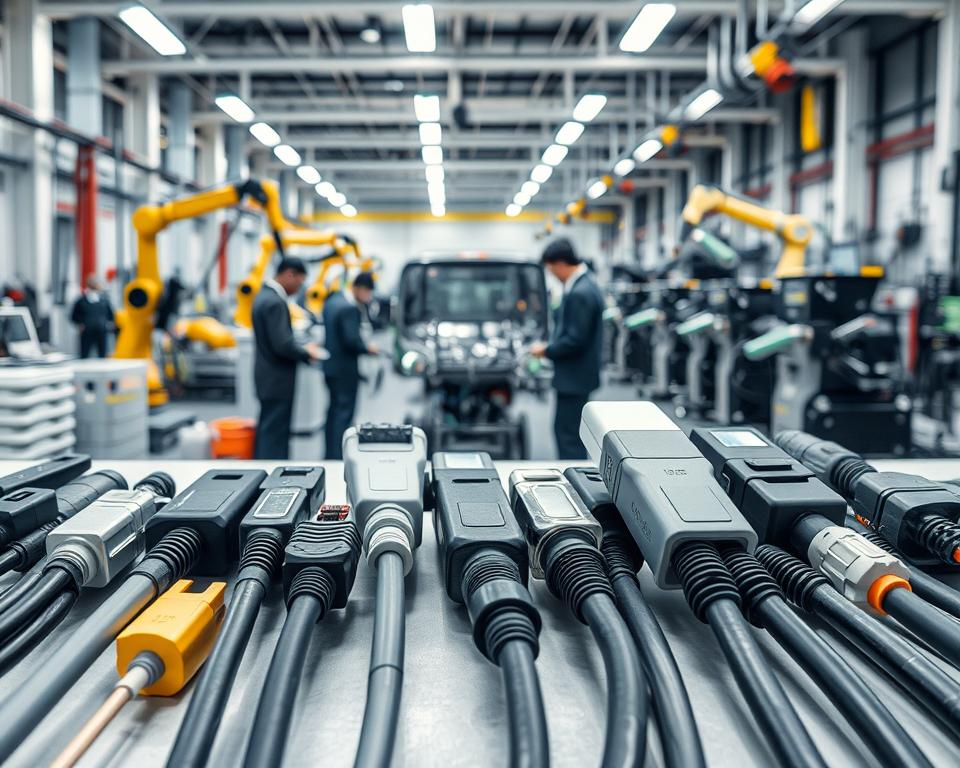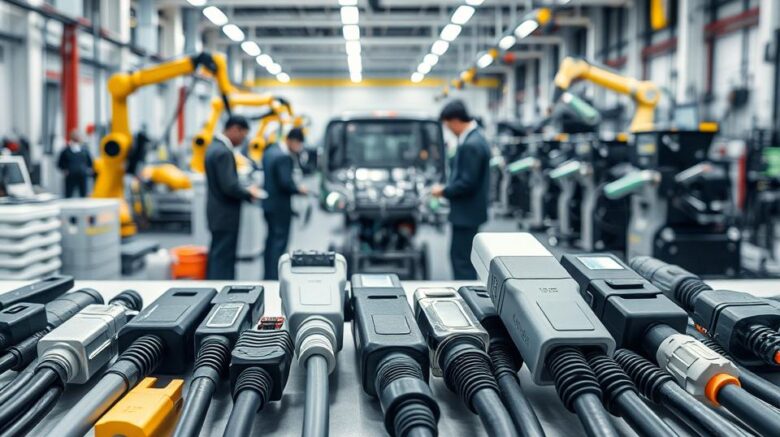Top EV Charging Cable Manufacturers for Your EV
The electric vehicle industry is on the rise, with the demand for reliable and efficient charging solutions growing exponentially. Currently, industry leaders have been at the forefront of this change, providing high-quality charging infrastructure. Southwire, for instance, has been a significant player since 2014, boasting over 1000 five-star reviews and 75 years of experience in the electrical construction industry.
The upswing in electric vehicle adoption creates a requirement for robust, fast, and reliable EV Charger Manufacturers. Top manufacturers are developing to meet these evolving needs, offering solutions that improve the overall charging experience.
Knowing the distinctions between various charging solutions is crucial for choosing correctly. Quality charging infrastructure directly impacts vehicle performance and customer satisfaction.
Principal Learnings
- Leading brands provide premium cables that boost durability and security.
- EV market expansion drives need for high-efficiency chargers.
- Top brands pioneer solutions for changing EV requirements.
- Quality charging cables directly impact charging efficiency and vehicle performance.
- Opting for top-tier cables yields future savings.

Why High-Quality EV Cables Matter
As more drivers choose EVs, the importance of top-grade EV charging cables is undeniable. The efficiency, security, and dependability of electric vehicle charging systems hinge upon the quality of the charging cables used.
How EV Charging Tech Has Advanced
Electric vehicle charging technology has undergone significant advancements in recent years, with a priority on faster charging speeds and enhanced protections. Modern EV charging cables are built for these requirements, incorporating superior materials and construction techniques to minimize energy waste and maximize transfer rates.
Why Quality Matters in EV Charging Infrastructure
Quality charging cables directly impact the overall performance and safety of EV charging infrastructure. Durable features, such as weather resistance and flexibility in extreme temperatures, maintain performance in harsh conditions. Additionally, regulatory compliance and following protocols are essential in ensuring that cables meet rigorous safety requirements.
| Key Features | Benefits |
|---|---|
| High-grade build quality | Minimized power loss during energy transfer |
| Enhanced durability features | Weather resistance, flexibility in extreme temperatures |
| Standards adherence | Rigorous safety requirements met |
| Maintainability | Long-term value proposition, reduced waste |
Products from Aichie Tech Electronics pass The Cable Lab’s stringent tests. Choosing maintainable Portable EV Charger Manufacturer, users can save hundreds over a decade by choosing repairs over replacements, lowering environmental impact.
Top EV Charging Cable Manufacturers in China
China is home to a growing number of EV charging cable manufacturers. These companies are crucial in supporting the expanding electric vehicle (EV) market, offering premium charging cables designed for various charging needs.
Wottz – Pioneers in EV Cables Since 2014
Wottz has established itself as a prominent player in the EV charging cable market since 2014. They offer a range of cables that cover Mode 1–4 charging standards, including Mode 1, 2, 3, and DC Fast Charging (Mode 4).
Aichie Tech Electronics’ 75-Year Legacy
Aichie Tech Electronics leverages 75 years of electrical expertise in its EV cables. Their products are built for residential and commercial applications.
Additional Key Cable Suppliers
Specialists in Type 1/Type 2 connectors and environmental-resistant cables are emerging players. These include Type 1 & 2 connector experts, as well as companies developing cables with enhanced flexibility and resistance to environmental factors.
Understanding Different Types of EV Charging Cables
As electric vehicles become increasingly popular, understanding the various types of EV Charging Cables is crucial for optimal charging experiences. Knowing cable types ensures you pick the right charger. The diversity in EV charging infrastructure demands a closer look at the cable options.
Type 1 vs Type 2 Explained
Type1 and Type2 charging cables are two common standards used for EV charging. Type 1, also known as SAE J1772, is North American standard, while Type 2, or Mennekes, is the standard in Europe. The right cable matches your car and charger. Type 2 cables often support higher charging capacities, making them suitable for faster charging.
Level2 and DC Fast Charging Solutions
Level 2 AC cables charge faster, up to 19.2 kW. DC Fast Charging cables, on the other hand, enable quick top-ups by on-site AC→DC conversion, allowing for much faster charging times. These cables are essential for long-distance EV travel, enabling drivers to recharge quickly.
Granny Chargers vs Tethered Units
Granny chargers plug into home outlets for emergency use. Tethered cables are attached permanently, offering ease at the cost of portability. The choice comes down to flexibility vs convenience.
Cable length, power rating, and connector type matter most. For instance, portable charging cables range from basic Level1 emergency chargers to more robust Level2 solutions. Vehicle-to-load (V2L) cables let EVs act as mobile power banks.
- Portable charging cables offer flexibility, with options ranging from basic to more robust Level2 solutions.
- Fixed cables add convenience, removing cable management tasks.
- Cable length is a critical consideration, with options ranging from 5-meter standard cables to 50-meter extended cables.
Essential EV Cable Characteristics
Premium cables stand out for durability, safety, and performance. These features are vital to safe, efficient charging.
All-Weather Durability
Cables must withstand rain, sun, and cold. Manufacturers like Wottz and Southwire craft their cables from recyclable materials that adhere to ROHS compliance, ensuring they perform in harsh climates. Their repairable builds support longevity and eco-reuse.
Flexibility and Ease of Use
Flexibility and ease of use are also critical factors. High-quality EV charging cables are built for easy handling without sacrificing strength. This flexibility is combined with rugged construction for lasting performance.
Regulatory Approvals
Approved safety marks ensure reliable performance. They ensure their products meet or exceed standards such as IEC62196 for connectors and UL2594 in North America. Independent labs verify safety, toughness, and weatherproofing.
| Certification | Description | Region |
|---|---|---|
| IEC62196 | Connector safety standards | International |
| UL2594 | Standard for electric vehicle supply equipment | North America |
| ROHS | Restriction of hazardous substances | International |
Emphasizing these attributes yields cables that are safe, durable, and user-friendly.
Innovative Technologies from Leading EV Charging Cable Manufacturers
New cable tech is transforming EV charging, with a focus on speed, improved signal integrity, and eco-friendly materials.
Thermal-Managed Fast Charging
Liquid-cooled charging cables are emerging as a key technology for ultra-fast charging, enabling electric vehicles to charge at significantly higher speeds without overheating.
Advanced Connector Tech
Hyperboloid contacts are being integrated into EV charging cables to enhance signal integrity, ensuring stable communication and power flow.
Sustainable and Recyclable Materials
Leading manufacturers are prioritizing sustainability in their cable designs, using recyclable materials and eco-friendly compounds that reduce environmental impact. For instance, companies like Aichie Tech Electronics and Wottz are embracing repairable designs and strict standards to foster reuse.
The industry’s shift towards sustainability includes the use of TPU jackets, avoidance of hazardous substances, and the development of take-back programs for end-of-life disassembly and material recovery.
How to Select the Right EV Charging Cable for Your Vehicle
Selecting the proper cable ensures optimal performance. To make an informed decision, consider several key factors.
Connector Compatibility
Ensure the charging cable is compatible with your vehicle’s connector type. Your vehicle’s onboard charger capacity determines the maximum AC charging rate it can accept.
Length Considerations
Choose a cable length that suits your charging needs. A longer cable adds reach at the cost of extra weight.
Considering Power Requirements and Charging Speed
Match your cable’s power handling to your vehicle’s capabilities. Standard Level 2 home charging operates at 7.2 kW, but some vehicles support up to 19.2 kW with appropriate electrical service.
Mind these points to pick a cable that fits your EV lifestyle.
Why Choose Premium Charging Solutions
With EV growth unabated, premium cables are essential. Investing in premium EV charging cables from established manufacturers like Wottz and Aichie Tech Electronics ensures superior durability and lower lifetime costs. Their serviceable designs enable repairs over replacements to cut waste. This approach supports eco-friendly EV use.
Selecting top-grade infrastructure prepares you for next-gen charging.
